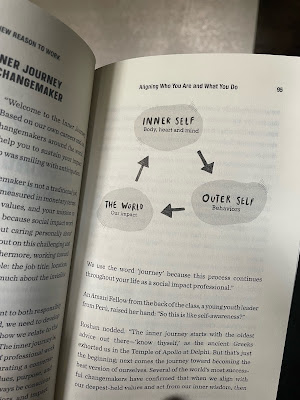My first class at UW!
As the commencement of my first course approaches, I find myself overwhelmed with a sense of anxiety. What should I do in my first class? Is it possible for me to effectively digest all of the material? Will I have the courage to speak? At this moment, I could not agree more with Jo Emerson. He said once, “Your mind can be your biggest enemy or your best friend".
In the beginning, before I met the instructor, the graders, and my friends, my mind seemed to be an enemy. I was afraid. Following the initial ten minutes of the class, my mind started to be my friend. My anxiety flew up. I can think strategically, particularly on how to establish my objectives for the current quarter. I have up to three goals. However, one ultimate goal is to push myself gently during this learning and adapting process. The concept of “gentleness” does not imply a state of complete aimlessness. This entails actively engaging in the learning process, absorbing as much as I need, and seizing every favorable opportunity during this quarter, as simple as (1) participating in class discussions, (2) raising my hand when having questions or ideas, and (3) finishing all assigned tasks. The initial session of Ekin's provided a soothing effect and helped me process everything in my mind better. Moreover, Anita Croft, through her listening workshop, completed it well.
 |
| Took a pic with the big W! One of the icons at UW! |
For a long time, when talking about listening, individuals, including myself, have mostly relied on the auditory sense of hearing. Anita demonstrated that listening encompasses more than what is initially perceived. It is possible to perceive auditory stimuli through all of our senses. I am intrigued by the idea that we can also “listen” to the smell. I recall that one of my classmates said, “I can smell the cigarette smoke!" after we heard one audio recording originating from a street environment. I love Anita’s demonstration of bringing tangible examples to the class.
Listening only with an ear is (might be) challenging for some people. Anita showed the potential for optimizing all senses to bring up the idea that when we listen, we put all of our consciousness into it, and it helps to make our act of listening easier than before. In the beginning, I found that it could not be fair for some people with disabilities, for example, deaf people. (I intended to pose this question, but I was unable to do so.) However, upon further contemplation of Anita’s session, I have come to the realization that the solution lies in Anita’s statement that our listening should extend beyond the auditory sense. We can also hear through our eyes, our nose, our skin, or our mouth. Deaf people, for instance, possess the ability to hear/listen through many means, such as lip reading, visual cues, or tactile support. At another level, it may be indicated that they (the Deaf or other people with disabilities) possess a greater ability to optimize their sensory input compared to myself, who has predominantly relied on auditory input for a long time.
 |
| My very initial class this quarter. A huge class with the other fellows from Cohort '23. |
Regarding the concept of listening, I previously believed that it primarily involved the auditory sense, where each sense has distinct duties that should not be mixed. Mouth to talk, nose to smell, eye to see, skin to feel. It works as it is. From Anita’s session, in short, I acquired the understanding that it is unwise to rely on one sense, such as hearing, when we listen. Instead, I have learned to maximize my listening skills by integrating all of my senses simultaneously. Attempting to make progress day by day is not easy, but it is worthwhile to try.



Komentar
Posting Komentar